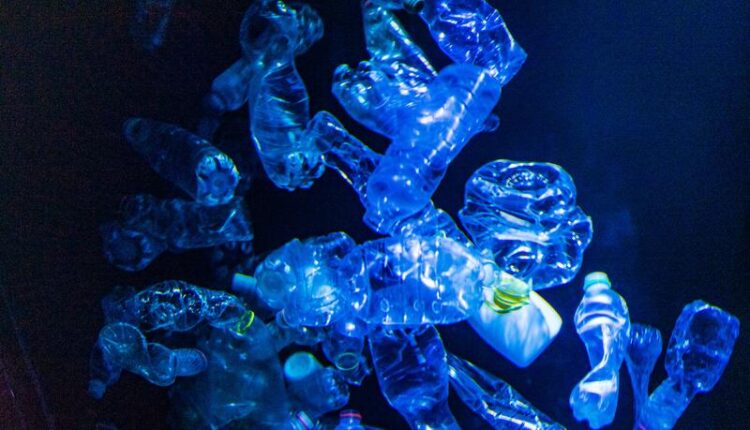Circular economy for plastics

Plastic in the sea
Photo: Jan Meßerschmidt
Biotechnological solutions for degradation and recycling of plastics.
Plastics are wonderful materials. They are extremely versatile and of almost eternal durability. But that also causes a problem. After around 100 years of plastic production, plastic particles are almost everywhere: in ground water, the oceans, the air and the food chain. Across the globe, considerable efforts are being taken to solve this “plastic crisis” by using biotechnological methods. However, most progress is restricted to a specific type of plastic, namely polyesters such as PET. A comment in the journal Nature Catalysis (DOI: 10.1038/s41929-020-00521-w) critically discusses the state of current research and suggests strategies for a bio-based circular economy for plastics.
Sophisticated solutions are required to achieve a circular economy for plastics. Currently, only a fraction of the plastic materials are recycled using energy and cost-intensive processes. One possibility for degrading certain plastics into their building blocks is to use enzymes or biotechnological processes that make use of microorganisms.
The building blocks that are released, also called monomers, can be used to make new plastics. If it is not possible to directly re-use the building blocks, the plastic should be degraded as far as possible to relieve the environment and provide access to the raw materials. Modern biotechnology can make a substantial contribution to both the end-of-use recycling of plastics as well as the aim to achieve a carbon neutral balance.
The publication “Possibilities and limitations of biotechnological plastic degradation and recycling” jointly written by scientists from the University of Greifswald http://www.uni-greifswald.de/en/, RWTH Aachen https://www.rwth-aachen.de/, the Fraunhofer Institut UMSICHT https://www.umsicht.fraunhofer.de/ and University College Dublin https://www.ucd.ie/, discusses the state of current research and highlights strategies for future developments.
The authors are contributing towards the joint project MIX-UP http://www.mix-up.eu/ – funded by the European Union in the framework of Horizon 2020 – together with scientists from China, to try to find ways of creating value from plastic waste originating from oceans as well as households, by using biotechnological methods. In these processes, microorganisms use the degradation products from plastics in a so-called “up-cycling” as a source of carbon for making valuable products.
“Whilst highly efficient enzymes have already been discovered and improved for the widely used plastic polyethylene terephthalate (PET), thus enabling economical recycling, no significant progress has yet been made for most other plastics,” explains Prof. Uwe Bornscheuer from the University of Greifswald. Dr. Ren Wei, who leads a junior research group at the Institute of Biochemistry adds that: “Unfortunately, there are several publications that raise false hopes. For instance, there is a lack of solid scientific proof in some reports about plastic-eating insects.”
Prof. Lars Blank from RWTH Aachen emphasises: “We need to distinguish two aspects: plastics, which we deliberately expose to the environment, such as mulching foils for agriculture, need to be decomposed rapidly – within weeks or months. For durable plastics, we need a medium-term solution. It should be ensured that degradation will take place within a few years – instead of centuries as is the case at the moment.” The authors suggest a scenario based on the following six principles: rethink – refuse – reduce – reuse – recycle – replace. They also aim to initiate a lively discussion on how to achieve a circular economy for plastics in the near future.
Further information
Wei, R., Tiso, T., Bertling, J. et al. (2020): „Possibilities and limitations of biotechnological plastic degradation and recycling,“ in: Nature Catalysis. >https://www.nature.com/articles/s41929-020-00521-w>;
Further background information “Behind the paper” https://chemistrycommunity.nature.com/posts/possibilities-and-limitations-of-bio…
Group of Prof. Dr. Uwe Bornscheuer at the Institute of Biochemistry at the University of Greifswald https://biochemie.uni-greifswald.de/forschung/forschung-in-den-arbeitskreisen/or…
Plastic in the sea ©Jan_Meßerschmidt
The image can be downloaded and used for free for editorial purposes in combination with this press release. You must name the respective author of the image. Download http://www.uni-greifswald.de/pressefotos
Contact at the University of Greifswald
Prof. Dr. Uwe Bornscheuer
Institute of Biochemistry
Felix-Hausdorff-Straße 4, 17489 Greifswald, Germany
Tel.: +49 3834 420 4367
uwe.bornscheuer@uni-greifswald.de
ResearchGate: https://www.researchgate.net/profile/Uwe_Bornscheuer
LinkedIn: https://www.linkedin.com/in/uwe-bornscheuer-1581827a/
Dr. Ren Wei
Institute of Biochemistry
Felix-Hausdorff-Straße 8, 17489 Greifswald, Germany
Tel.: +49 3834 420 4455
ren.wei@uni-greifswald.de
Media Contact
All latest news from the category: Life Sciences and Chemistry
Articles and reports from the Life Sciences and chemistry area deal with applied and basic research into modern biology, chemistry and human medicine.
Valuable information can be found on a range of life sciences fields including bacteriology, biochemistry, bionics, bioinformatics, biophysics, biotechnology, genetics, geobotany, human biology, marine biology, microbiology, molecular biology, cellular biology, zoology, bioinorganic chemistry, microchemistry and environmental chemistry.
Newest articles

Innovative 3D printed scaffolds offer new hope for bone healing
Researchers at the Institute for Bioengineering of Catalonia have developed novel 3D printed PLA-CaP scaffolds that promote blood vessel formation, ensuring better healing and regeneration of bone tissue. Bone is…

The surprising role of gut infection in Alzheimer’s disease
ASU- and Banner Alzheimer’s Institute-led study implicates link between a common virus and the disease, which travels from the gut to the brain and may be a target for antiviral…

Molecular gardening: New enzymes discovered for protein modification pruning
How deubiquitinases USP53 and USP54 cleave long polyubiquitin chains and how the former is linked to liver disease in children. Deubiquitinases (DUBs) are enzymes used by cells to trim protein…



